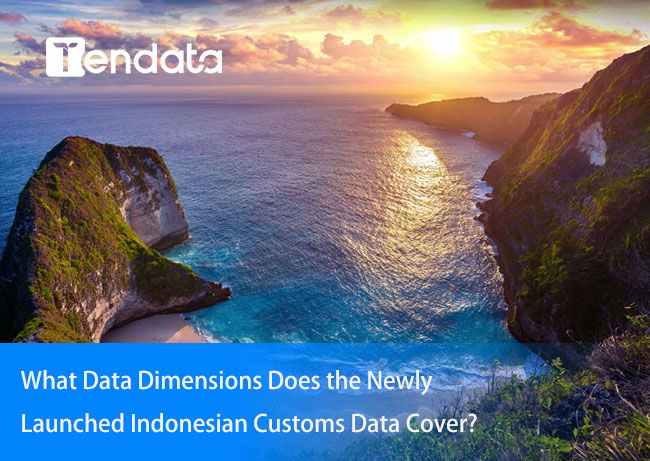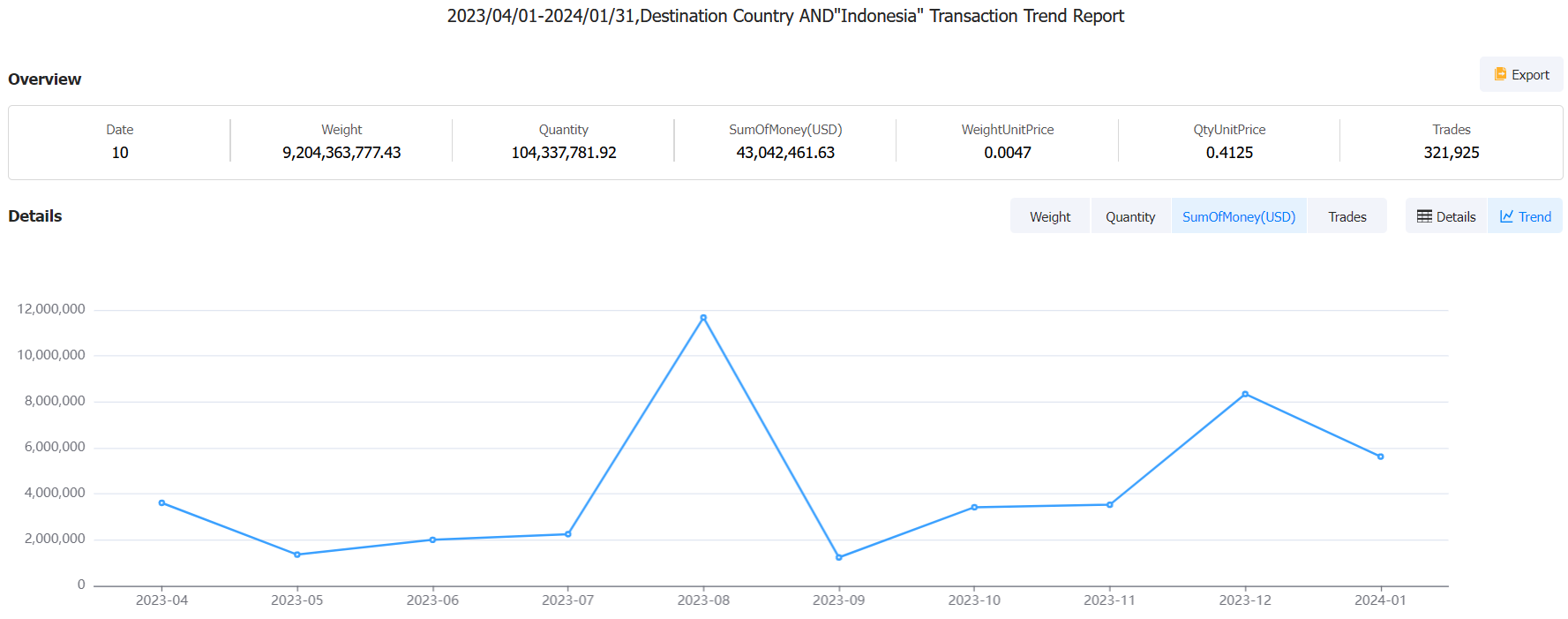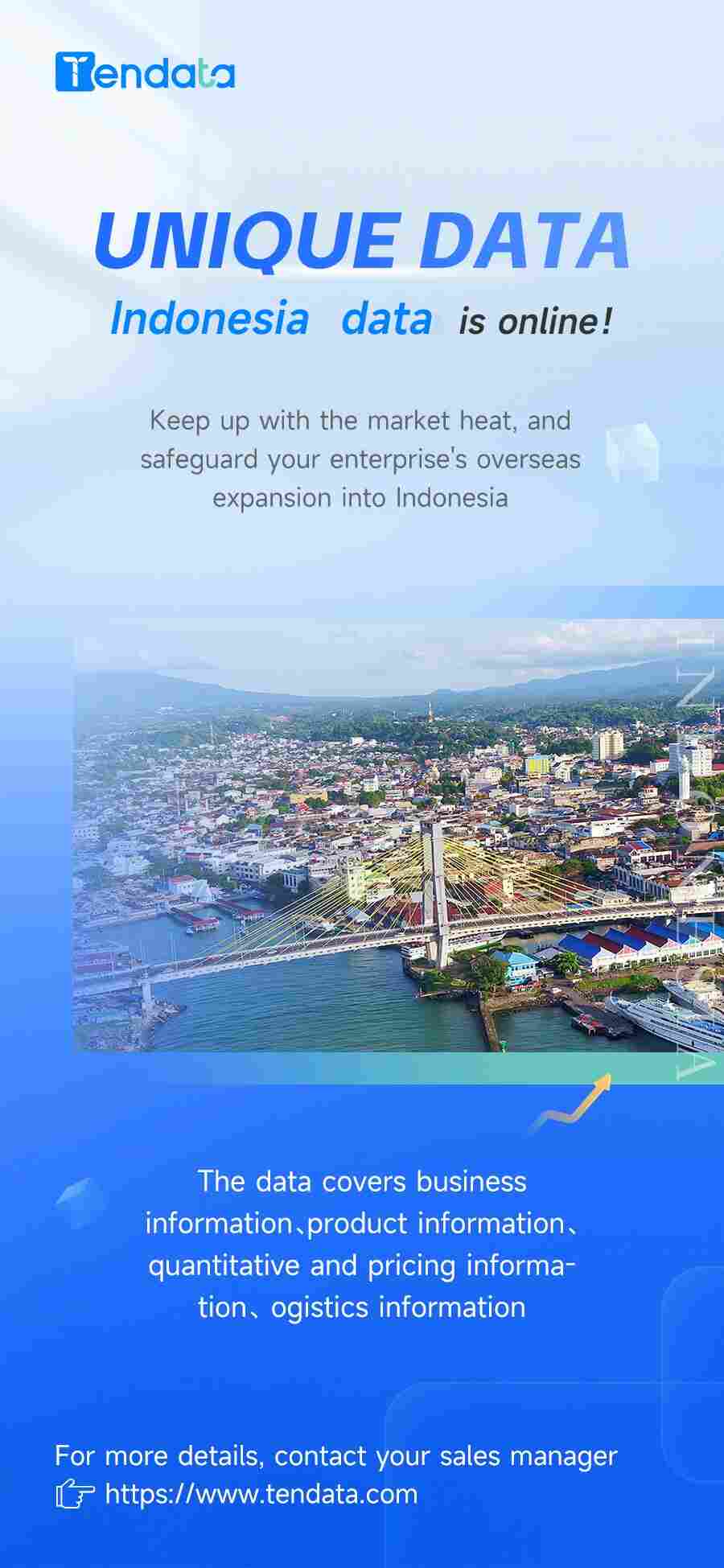 Trade Data Provider
Trade Data Provider
 2024-03-01
2024-03-01
Tendata has launched Indonesian customs data to assist you in gaining better insights into the Indonesian market, fully exploring market demands, and identifying growth opportunities. At the same time, it helps you connect with business decision-makers with a single click, facilitating precise and efficient development of Indonesian customers, leading to finding the second growth curve for your business!
What Data Dimensions Does the Newly Launched Indonesian Customs Data Cover?
· Business Information: Importer names, exporter names, importer addresses, exporter addresses, consignees, buyers, consignee addresses, buyer addresses, etc.
· Product Information: Customs codes, product descriptions, etc.
· Quantity and Price Information: Total price, quantity, transaction methods, etc.
· Logistics Information: Dates, loading ports, unloading ports, etc.

Part 1, Indonesia: A Yet-to-Be-Explored Business Frontier
Since the implementation of the Regional Comprehensive Economic Partnership (RCEP) on January 1st, two years ago, China's enthusiasm for Southeast Asia has only increased. Indonesia, as the world's fourth most populous country and the largest economy in Southeast Asia, possesses rich natural resources, geographical advantages as a crucial regional trade hub connecting Asia and Oceania, a growing middle class, and a vast consumer market. The trend of Chinese businesses entering the Indonesian market is on the rise.
According to Indonesian official data, in just the first half of 2023, China ranked as Indonesia's second-largest source of foreign investment with a total investment of $3.8 billion, second only to Singapore ($7.7 billion). Looking at the trade trends of Chinese exports to Indonesia over the past three years, the number of trades has reached 1,011,739, with the number of trades increasing each year.
Part 2, Identify Your Market Opportunities in Indonesia
01. Understand the Market, Seize Business Opportunities
(1) Overview of the Indonesian Market
Population: Indonesia has over 300 different ethnic groups and language communities, with a population of nearly 300 million. Most Indonesians primarily use the Malay language. The population is concentrated in the age group of 18-35, with around 60% of the population below the age of 30, indicating a vast labor force and consumer market.
Economy: Indonesia is the largest economy in Southeast Asia, with a GDP exceeding $1 trillion, ranking 17th globally. Consumers in the middle and affluent classes amount to 97 million, offering enormous economic potential. As the world's largest archipelagic country, Indonesia possesses unparalleled natural resources and economic potential, with abundant mineral resources and rich agricultural and fisheries resources.
Major Cities and Regions: Jakarta, as the capital and largest city of Indonesia, serves as the political, economic, and cultural center of the country. Numerous multinational and local companies have headquarters here, providing entrepreneurs and investors with numerous opportunities. However, Jakarta faces challenges such as traffic congestion, pollution, and inadequate infrastructure.

(2) Consumer Habits and Preferences
Indonesia has one of the highest social media usage rates globally. For instance, Indonesia ranks among the top users of active users on Facebook, Twitter, and Instagram. With the widespread use of the internet, Indonesia's e-commerce market has experienced explosive growth, especially among the younger population. Despite embracing a modern lifestyle, Indonesians still respect and value family traditions. They celebrate various events during important family and traditional festivals.
(3) Local Policies and Regulations
In Indonesia, the main government departments responsible for regulating foreign investment are the Investment Ministry (formerly the Investment Coordinating Board, BKPM), the Finance Ministry, and the Energy and Mineral Resources Ministry. According to Indonesian regulations, the country has eliminated the requirement for capital investment registration certificates and in-principle investment permits. Not all business activities require a business license under the risk-based licensing system, simplifying many processes.
Indonesia has actively promoted free trade policies, similar to China, having joined both the ASEAN Free Trade Area (AFTA) and the Regional Comprehensive Economic Partnership (RCEP). This provides significant opportunities for Chinese companies entering the Indonesian market. Indonesia supports foreign entrepreneurs, and the "New Investment List" includes 245 "priority sectors," among which 183 investment areas enjoy tax incentives, 18 areas benefit from income tax exemptions, and 44 areas receive investment allowances. Industries included in the "priority sectors" for development investment can enjoy fiscal incentives, including investment income tax reductions, corporate income tax reductions, and tariff preferences.
(4) Religion and Culture
Indonesia is predominantly an Islamic country, and products or services should not offend local religious practices. Indonesians place great importance on festivals, providing opportunities for special promotions or gifts during these periods to attract consumers. While Indonesians have some flexibility with time, punctuality is still a sign of respect in the business environment. Taking time for small talk before getting into business is crucial for building trust and relationships.
Despite being a tropical country, many Indonesian women choose to dress conservatively due to the influence of Islam. If expanding into the Indonesian market, attention should be paid to clothing choices to align with local culture. For example, women should consider wearing more conservative clothing. Indonesian cuisine is renowned for its rich spices and flavors, with common ingredients including chili, coconut milk, and lemongrass. Popular dishes include chips, Indonesian satay, and curry. Family and social activities are central to Indonesian life, with family gatherings, weddings, and religious celebrations attracting large numbers of participants. Singing is a popular form of entertainment, and karaoke is widespread.
02. Choose the Right Industry and Products to Facilitate Success
According to data from the Tendata Foreign Trade Platform, among the products imported by Indonesia from the world in the past three years, products such as wheat and sugar, 3C products like laptops, and products used for clothing like cotton rank relatively high in terms of total import value.
Furthermore, data from the Tendata Foreign Trade Platform also shows that popular products exported from China to Indonesia in 2023 include metal, building materials, 3C products like smartphones, dyed fabrics and footwear, toys, etc.

The Indonesian market has high demand for electronic products, fashion apparel, home goods, and food and beverages. These products are well-received by Indonesian consumers.
(1) Electronic Products
Indonesian consumers have a strong demand for electronic products, especially smartphones, tablets, and televisions.
(2) Fashion Apparel
In the rapidly developing Indonesian fashion market, young people are very interested in fashion trends. To enter the Indonesian market, consider launching fashion apparel with unique designs and high-quality fabrics to attract young Indonesian consumers.
(3) Home Goods
With the growth of Indonesia's middle class, there is an increasing demand for high-quality home goods. To meet the Indonesian consumers' pursuit of a comfortable lifestyle, provide various home products such as furniture, kitchenware, and home decor. Also, pay attention to environmental trends and sustainable development, and introduce green products that align with local consumer preferences.
(4) Food and Beverages
Indonesia has a rich food culture, and there is a high interest in various cuisines and beverages, especially showing a strong interest in Chinese specialty foods. Companies can capitalize on the cultural exchange between China and Indonesia, offering customized products and creating unique flavors and product combinations to attract Indonesian consumers.
03. Precisely Develop Indonesian Customers
Customer development is a comprehensive process that needs to consider cultural differences, market positioning, channel selection, and brand building.
Tendata has launched Indonesian data to help you gain better insights into the Indonesian market, fully explore market demands and growth points. At the same time, it helps you contact corporate decision-makers with one click, develop Indonesian customers accurately and efficiently, and find the second growth curve of your company!

Category
Leave Message for Demo Request or Questions


 T-info
T-info T-discovery
T-discovery

 My
Tendata
My
Tendata Market Analysis
Market Analysis Customer
Development
Customer
Development Competitor
Monitoring
Competitor
Monitoring Customer Relationship
Customer Relationship





































































































































